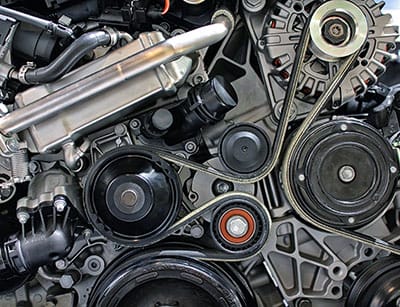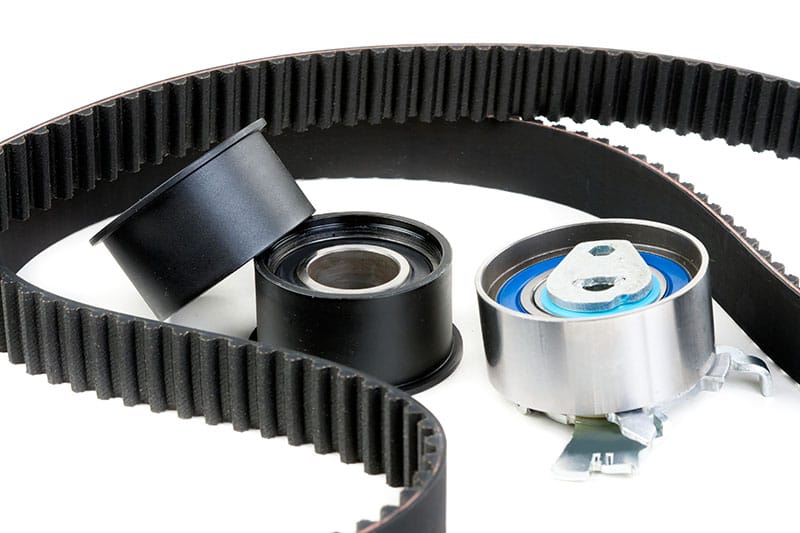Car Fixes Without the Hassle – We Travel, You Unwind!
Belt Replacement
Free Instant Quote

Car Belt Replacement Near Me | Mobile Mechanic Pros of Arlington
The belts in your vehicle are essential components that play a crucial role in its performance. Depending on your car’s make and model, the engine may have a different belt configuration, but they all serve important functions. Some belts are vital for your car to operate properly.
These belts use the engine’s rotational force to power various accessories, including the alternator, power steering, water pump, and air conditioning unit. If one of these belts fails, the related component will also stop functioning. At Mobile Mechanic Pros of Arlington, we always check the belts during our repairs to ensure they are in good condition and replace them before they can cause any issues.
Types of Auto Belts and Their Functions
Serpentine Belt
This long, continuous belt drives multiple accessories in your engine, such as the alternator, power steering pump, water pump, and air conditioning compressor. The serpentine belt is crucial for powering essential components, and if it fails, your vehicle may experience issues like loss of steering control or overheating.
Timing Belt
The timing belt synchronizes the crankshaft and camshaft rotation, ensuring the engine’s valves open and close correctly during each cylinder’s intake and exhaust strokes. A worn or broken timing belt can lead to serious engine damage, so it is essential to replace it according to the manufacturer’s recommended intervals.
V-Belt
V-belts are used to drive various engine components, similar to serpentine belts, but narrower and have a V-shaped cross-section. They may be used for specific accessories like the alternator or water pump. V-belts can wear out and lose tension over time, leading to reduced performance of the components they drive.
Accessory Belt
This term often refers to the belts that drive accessories such as the air conditioning compressor, power steering pump, and alternator. These belts can include serpentine and V-belts. A failing accessory belt can impact the functionality of essential vehicle systems, such as steering and electrical systems.
Fan Belt
The fan belt is specifically designed to drive the engine cooling fan. In some vehicles, this function may be integrated into the serpentine belt. A malfunctioning fan belt can lead to engine overheating, so keeping it in good condition is essential.
Signs You Need a Serpentine or Timing Belt Replacement
Signs of Serpentine Belt Wear
- Squeaking or Squealing Noises: If you hear a high-pitched squeaking or squealing sound coming from the engine bay, it could be a sign that your serpentine belt is worn or loose.
- Visible Cracks or Fraying: Inspect the belt for any visible signs of damage, such as cracks, fraying edges, or missing pieces. These are clear indicators that the belt needs to be replaced.
- Loss of Power Steering: If your steering feels stiff or difficult to turn, it may be due to a failing serpentine belt, which powers the power steering pump.
- Overheating Engine: A worn serpentine belt can impact the operation of the water pump, leading to overheating. If your engine temperature rises unexpectedly, have the belt checked.
- Warning Light: Some vehicles have dashboard warning lights that indicate issues with the serpentine belt or the accessories it drives. Pay attention to any warning lights that appear.
Signs of Timing Belt Wear:
- Engine Misfiring: If your engine is misfiring or running roughly, it could be a sign that the timing belt is worn or has jumped a tooth, affecting the timing of the engine.
- Ticking Noise: A ticking noise coming from the front of the engine can indicate that the timing belt tensioner is failing or that the belt itself is damaged.
- Oil Leaks: If you notice oil leaking from the front of the engine, it could be a sign of a failing timing belt seal. This may lead to further engine damage if not addressed.
- Warning Light: Some vehicles have a warning light that indicates timing belt issues. If this light comes on, it’s essential to have your vehicle inspected promptly.
- Age and Mileage: Timing belts typically have a recommended replacement interval between 60,000 and 100,000 miles. If you’re nearing or have surpassed this mileage, it’s wise to consider a replacement, even if you don’t notice any symptoms.

Belt Tensioners
Belt tensioners are important for maintaining the correct tension on the associated belts. If a tensioner becomes weak, it can cause the belt to wear out more quickly and unevenly. On the other hand, if the tensioner is too tight or sticking, it can lead to premature wear on the water pump and other connected accessories.
Talk to Us Today!
Our skilled technicians can identify any uneven wear on the belts. When the belt is removed, they will check that the tensioner moves freely and maintains firm tension. They will also ensure the pulleys are properly aligned for smooth operation.
If you suspect that your belts or tensioners need attention, don’t hesitate to contact Mobile Mechanic Pros of Arlington. We’re here to help keep your vehicle running smoothly!
Call us now to schedule a service appointment!
Next: VW Repair
